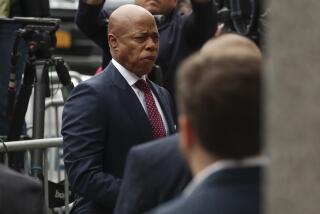Mexico City’s Mayor Defies Order to Pay for Seized Land
- Share via
MEXICO CITY — In a politically risky move that could lead to his impeachment or help him win the presidency in 2006, the mayor of Mexico’s capital is defying the Supreme Court and refusing to pay $164 million to the owner of land seized by the city nearly 15 years ago.
The battle between populist Mayor Andres Manuel Lopez Obrador and the judicial system has captured the nation’s attention and once again put a spotlight on Mexico’s confusing and outdated property laws.
Lopez Obrador is considered a leading contender in the 2006 elections to replace President Vicente Fox, who is barred by law from seeking another term. Although legal experts said Tuesday that a failure to obey the court could bring about the mayor’s impeachment, others said he may be using the case for political gain by claiming that the restitution demand is an attempt to defraud the city of much-needed funds.
“He is trying to make himself a fighter against institutionalized corruption, of acting decisively to uphold common-sense justice as opposed to mere legality,” said Jean Francois Prudhomme, a political science professor at Colegio de Mexico here.
At a news conference Monday evening, Lopez Obrador vowed not to pay the claim, waving documents that he said proved that the 750-acre parcel in question could not have been owned before 1989 by Enrique Arcipreste, who the courts said is owed the restitution.
“What we are defending is the public interest. We cannot pay [$164 million] as a result of a fraud,” the mayor said. “The authorities have to investigate the case to find out who is responsible.”
The Supreme Court on Tuesday turned down the mayor’s request to reopen the case. But it offered Lopez Obrador some positive news, saying it would examine the methods used to calculate the restitution.
More than 9,800 families -- many of them squatters -- were living on the 750-acre parcel, called Paraje San Juan, when the city expropriated it in 1989. Expropriations are still used by the city to legalize squatters’ ownership of land they have taken over.
The government didn’t compensate anyone for the land in 1989, because the title was in dispute. Arcipreste subsequently came forward to claim ownership, but the city said his documents were insufficient. He since has been trying to establish his right to the property.
The case has been working its way through the courts for years but hit the headlines in September, when a federal court ordered Mexico City to pay Arcipreste $164 million.
The Supreme Court’s decision last month not to intervene in the case made the matter final from a legal standpoint, constitutional law expert Raul Mejia said Tuesday.
“There is no way now to revoke the final sentence,” said Mejia, a professor at the Autonomous Technological Institute of Mexico. “The Supreme Court has the power to force Lopez Obrador to step down if he doesn’t conform to the sentence.”
Enrique Diaz Aranda, a constitutional law expert at the National Autonomous University of Mexico, said Lopez Obrador’s staff should have come up with the documents alleging fraud long ago. “Instead of blaming others outside the government, the mayor should look inside to determine why [the city’s legal staff] failed to contest the ruling in the right form and timing.”
Alvaro Arceo Corcuera, a legal advisor to the mayor, said Tuesday that the city did present other documents suggesting fraud but that the court declined to accept them as proof.
Arcipreste’s lawyer, Jose Luis Gonzalez Mesa, invited Lopez Obrador to a public debate of the case, but the mayor declined. He said his client had ample proof of ownership and would display the documents to the public Thursday.
The tangled history of the case is seen by many as just one more example of the inherent confusion and corruption in Mexico’s property laws.
“In many Mexican cities and states, land registries are incomplete, inaccurate and not kept up to date,” said Dale Furnish, an attorney and board member at the National Law Center for Inter-American Trade, a Tucson-based think tank that has proposed a pilot program to modernize property registry in four cities in Baja California and Sonora states.
Prudhomme, the political science professor, said the mayor’s insistence that he won’t pay the $164 million may mean that he will resign to run for president before his term is up in 2006 rather than reverse himself. Although Lopez Obrador has yet to declare his intention to seek the presidency, recent polls show that he is the favorite against a variety of possible opponents.
Lopez Obrador has taken a number of populist stands since becoming mayor in 2000. He has opposed adopting daylight saving time and federal taxes on drugs and food, and demanded that bankers pay for police protection. He also initiated $60 monthly payments to the elderly living in the capital.
More to Read
Sign up for Essential California
The most important California stories and recommendations in your inbox every morning.
You may occasionally receive promotional content from the Los Angeles Times.













